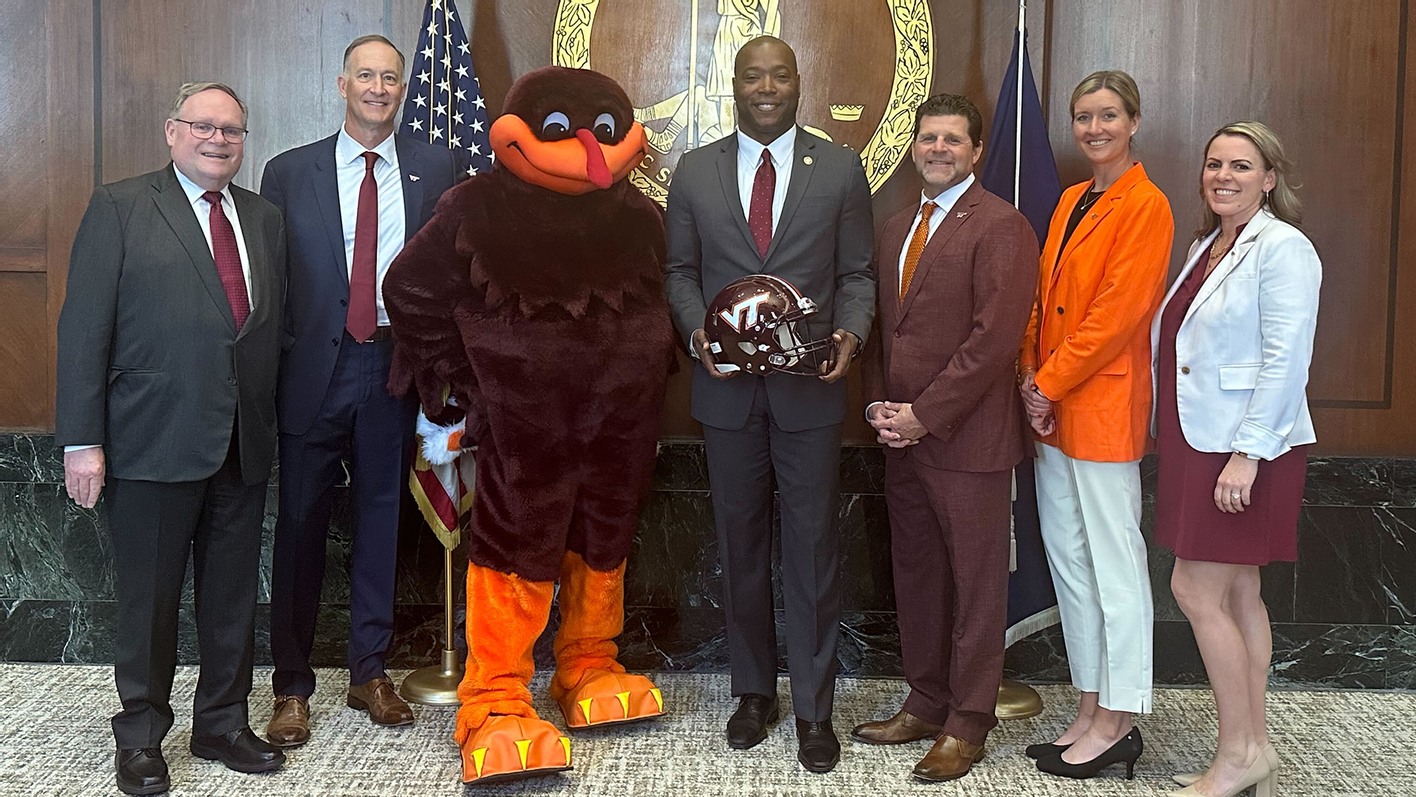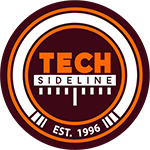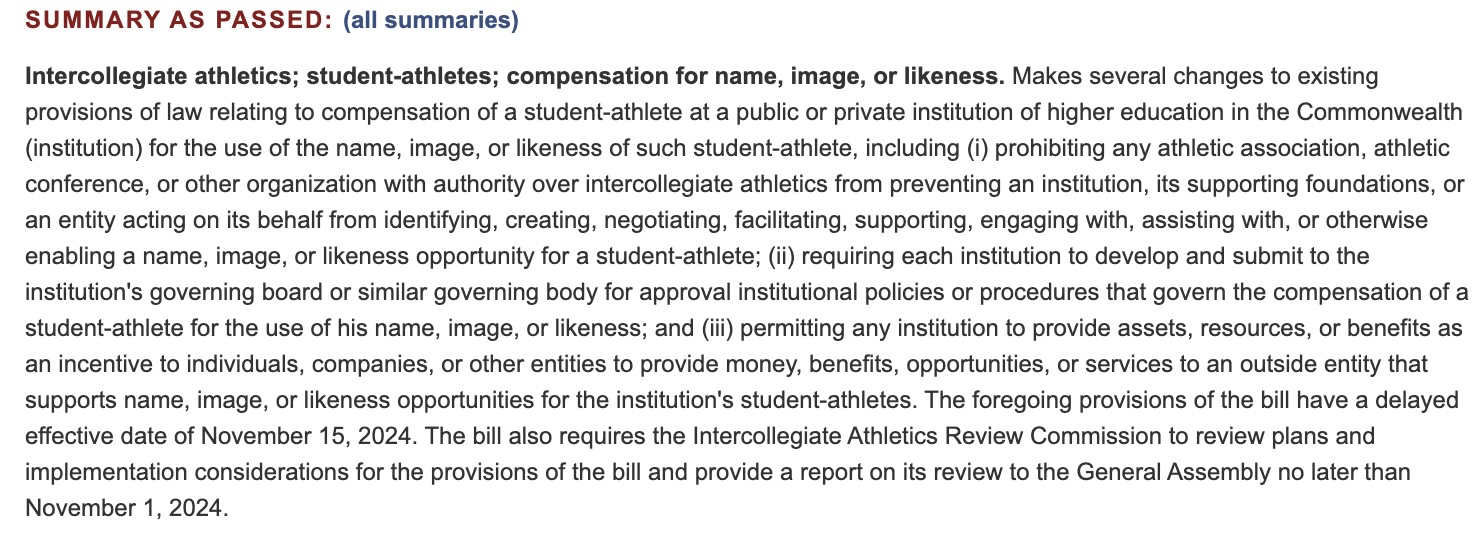
Virginia Gov. Glenn Youngkin signed House Bill 1505 Thursday morning in Richmond, unique legislation — which goes into effect on July 1, 2024 — that puts the Commonwealth at the forefront of the NIL conversation.
The new law will allow universities in Virginia to facilitate name, image and likeness opportunities for student-athletes. The operations can now legally be run in-house and will be streamlined through school involvement.
The Hokies were represented by director of athletics Whit Babcock, football coach Brent Pry, lacrosse coach Kristen Skiera, the HokieBird and others — including Sen. Aaron Rouse, D-Virginia Beach, a former All-ACC safety at Virginia Tech — at the ceremony.
“We are thankful to the state legislature and Governor Youngkin for their proactive work in the NIL space,” Babcock said in Virginia Tech’s press release. “We take care of our student-athletes and recognize the value they bring to ensure the longstanding success of our athletic programs.
“Not only does this position us more competitively among other states during this critical time, but it also allows for more school involvement as we continue to enhance our recruiting and retention efforts to bring the most talented student-athletes to Virginia Tech.”
Virginia is the first state to make it illegal for the NCAA to punish a school for directly compensating student-athletes for their NIL rights. Current NCAA rules prohibit institutions from playing any role in a NIL deal with a student-athlete.
The summary of the bill from Virginia’s Legislative Information System:

This Content is Presented by Tom Sproul of Coldwell Banker Townside REALTORS
Coldwell Banker Townside Realtors: Locally Owned. Locally Known. Locally Trusted.We know home. If you are in the market to purchase or sell a residential property or are looking for land or investment property in Southwest Virginia, we have you covered.
Contact Tom Sproul today to ask about opportunities buying or selling in the New River Valley. Click here to learn more.
According to ESPN, six other states — Illinois, Louisiana, Mississippi, Nebraska, Oklahoma and South Carolina — have pending legislation to address the situation but are based around NCAA or federal regulations changing to allow it. Virginia is ahead of the curve in that regard, and this law could create some urgency across the country for a rule change at the NCAA or federal government level.
How might this influence Virginia Tech and other universities in the Commonwealth, such as James Madison, Norfolk State, Old Dominion, Virginia, William & Mary and others?
Babcock gave some examples to David Teel of The Richmond Times-Dispatch of how the Hokies might operate under the new guidelines. They could charge admission for the spring game with the proceeds going to NIL, use the on-campus ACC Network studio or partner with Playfly Sports, the school’s multi-media rights holder starting July 1, for NIL opportunities.
Tech will now be able to use its own funds to pay student-athletes for appearing in marketing campaigns, though the law specifically states that student-athletes should not be considered employees of the schools. The legislation will also make it legal for Tech to directly present specific NIL deals to recruits before they enroll.
“I commend our state leaders for their proactive work in the evolution of college athletics,” Pry said in Tech’s release. “This positions us favorably and competitively at a critical time. The bill is a win-win for our school, our student-athletes and our donors.”
According to ESPN, Babcock said he expects Virginia Tech to have a plan in place by July when the law goes into effect. It will likely be streamlined through the Hokie Club, the athletic department’s official fundraising organization.
The bill was sponsored by Del. Terry Austin, R-Botetourt, who worked closely with Sen. Rouse. Jason Baum, UVa’s deputy athletic director for legal and regulatory affairs, was the primary author.
The Hokies were joined by representatives from UVa (AD Carla Williams, football coach Tony Elliott and volleyball coach Shannon Wells) and VCU (AD Ed McLaughlin and men’s basketball coach Ryan Odom) at the ceremony.






 Print
Print







I’m not convinced, to be honest, about the whole thing. I foresee lawsuits, instability, and inequities. The NCAA will certainly not be able to regulate or otherwise manage this system once the big money starts flowing. Same with school leadership. I don’t know. I just don’t see why college sports needs more than what it already has. And we’re fooling ourselves if we think for a second that this new law will make Virginia schools more competitive. Other states will follow suit and we’re back at square one.
Two concerns:
– Suppose the NCAA challenges this VA law in court and wins? Would VT and/or our athletes receiving NIL be subject to penalties?
– With VT and the Hokie Club getting more involved with NIL, will we contributors get priority points for NIL donations?
It does beg the question who has jurisdiction over the NCAA. Can states make laws that override NCAA ruses? Has this general prosecuted before?
How does this work in association with Title XI?
TBD.
By outsourcing the athlete contracts and tasks and payments to an outside collective like Triumph NIL, VT and other schools may be able to avoid Title IX (because it’s not the school who is paying the athletes, but an outside entity).
But we shall see. There will be lawsuits, and that’ll decide it.
NLRB is after ND about its ‘Student Athletes’ being employees. The Virginia NIL bill along with others being lined up in other states will lead to the final ‘revolution’ that changes college sports forever. Employee status will mean unionization. Enjoy it while we can.
Mixed feelings on this too. I think it needs to happen to be competitive with other schools, but I also think this is changing college sports and not in a good way.
With unionization comes collective bargaining. And it’s at that point that guardrails will be put in place to stop the athletes from transferring willy-nilly. That’ll be what the schools (as a group) want.
There will be all kinds of give-and-take in collective bargaining negotiations, and that will bring some sanity, as opposed to what we have now, where there are no controls and everyone just does what they want.
(Heard in a future, say, UGA or ‘Bama huddle):
QB: “Outside screen to weak side on 2”, BREAK!
RB: “Uh, in the USDoL CFB F
handbook, section 4 §153b, it states ‘after 100 yd (gross) gain, an O-player recipient gets 15 sec. to catch breath before resuming play’. If I don’t get a breather by the 27 yd line, I’m filing a grievance with the NLRB board”
QB: “Let’s see what Law Coaches Shapiro & Bligh have to say…..
TIMEOUT!
(Hey, Union rules say we still have 12 left for the quarter”
I hope this will catch the eye’s of the SEC. When the go to add two more like VT and NC State. They would be to great programs for that league.
SEC would be awful for VT. Lived in the footprint for 28 years. The new Superleague propossal, or a variation of this by merging with BIG would be much more lucrative to VT.
Well, I bet the state collectives aren’t very happy right now.
I thought the same thing
The summary says the law will go into effect Nov 15, 2024. The governor modified it to go into effect 7/1/24.
Just wonder how long the NCAA exists. We talk about ACC exploding. Maybe we should be focusing on the NCAA’s future. Doesn’t look too bright to me.
Exactly! The NCAA has lost control… It is time to blow the whole thing up and make some athletes employees:
1. Mandate salary caps across all sports at each school.
2. Each school can decide which sports they want to spend their money on (wouldn’t this be interesting!!)
3. Offer an education as a benefit not a requirement.
In order to implement your suggestions, we will need a governing body such as the NCAA – can’t regulate anything without a regulator. What happens if a school goes over the salary cap? Rhetorical question but again, it begs regulation of some kind.
If VT doesn’t improve their fundraising effectivess quickly this may not matter much.
I’d suggest a few fixes would be to consider a Clemson like model to fund some of the more popular non revenue sports.
They also need to get better sales folks. If it’s the same people that call me for ticket sales or giving they’ve got to improve those sales skills asap.
Nebraska Governor signed NIL Bill today.
Probably won’t matter soon as the ncaa is backpedaling furiously as judges change their rules. Virginia did the heavy lifting on this and the NCAA will change their NIL RULES IMO.
Great move. Interesting to see how a state like Georgia views this. With one school dominating the athletic landscape and half of the law makers UGA grads; this type of legislation may never pass in GA.